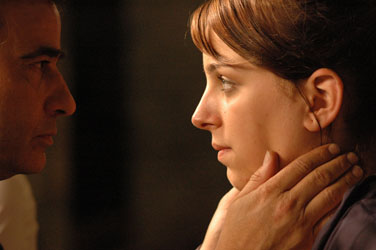 If you’d expect a Spanish (or, more accurately, Catalan) family drama to be full of overwrought passion, you might be pleasantly surprised by Three Days With the Family. Mar Coll’s confident debut film as director and co-writer (with her friend Valentina Viso) shows that middle-class repression and the fear of intimacy are not restricted to stiff-upper-lip Brits.
If you’d expect a Spanish (or, more accurately, Catalan) family drama to be full of overwrought passion, you might be pleasantly surprised by Three Days With the Family. Mar Coll’s confident debut film as director and co-writer (with her friend Valentina Viso) shows that middle-class repression and the fear of intimacy are not restricted to stiff-upper-lip Brits.The film follows directionless student Lea (Nausicaa Bonnin) as she returns to Catalonia for the funeral of her grandfather. She’s approaching a turning point in her life; having failed her exams, she is half-heartedly planning to abandon her ambition of becoming an aeronautical engineer to help her selfish boyfriend open an ambitious bar and cultural centre.
As she gathers with her parents, uncles, aunt and cousins, there are other issues waiting to be addressed. It soon becomes apparent that her bourgeois patriarchal family runs on hypocrisy and the need to keep up appearances rather than warmth or intimacy.
For instance, Lea’s parents have been separated for two years, but her father Josep Maria (Eduard Fernandez) has been unable to let the rest of the family know. Meanwhile, her aunt Virginia (Amalia Sancho) has been virtually banished from the family after writing a successful autobiographical novel that painted an unflattering picture of her lawyer father.
The sparse script vividly depicts the empty gestures that replace genuine emotion among the family; whenever awkward subjects threaten to surface, the need to maintain a respectable front takes over. There are no overblown dramatic moments, but the small psychological transitions and shifts depicted prove very powerful within the low-key naturalistic setting.
Indeed, one of the film’s main strengths is its strongly naturalistic – almost documentary – style. It’s shot in what looks like natural light throughout, and the only music used is the opera that Josep Maria constantly uses to fill the awkward silences. One of the film’s key moments comes when Lea turns off the CD and insists on talking to her father about how she feels.
The naturalistic tone continues to the closing sequence, in which the credits appear silently as the gathered family watch a cemetery worker cement the patriarch into his tomb. We've seen hope for the future among the youngest generation of the family, and the closing image beautifully symbolises the shift taking place.
The film has already won a number of awards at Spanish festivals, but I don’t know how much of a release it’ll get over here; this was its first screening outside Spain. However, it’s a beautifully measured and subtle piece of work that smacks of absolute truth and honesty in its depiction of family relationships. It’s well worth keeping an eye out for.


No comments:
Post a Comment